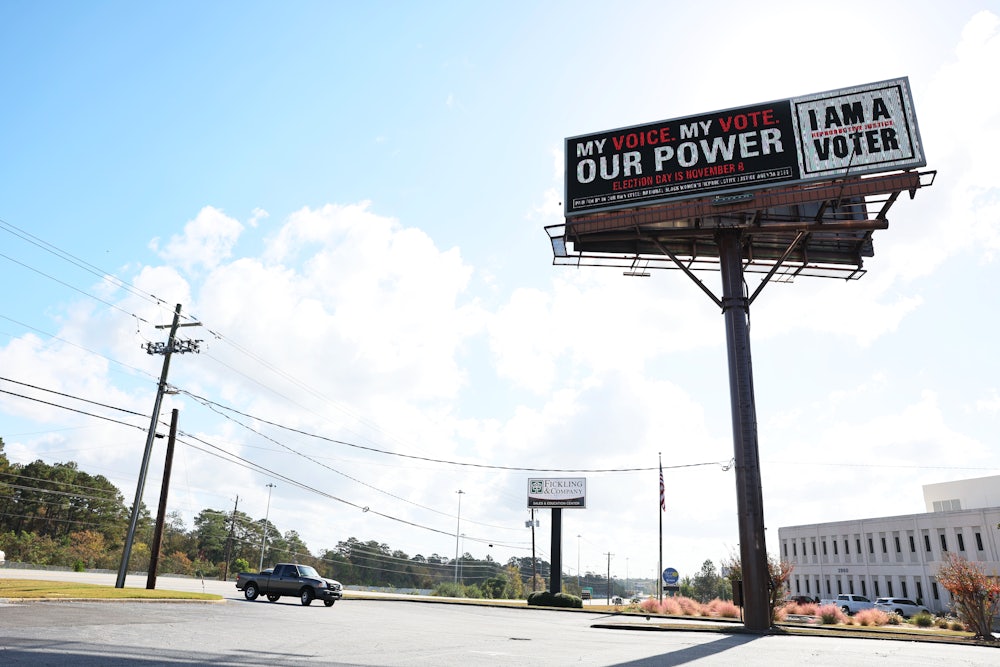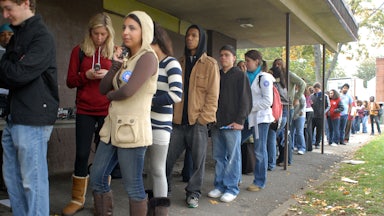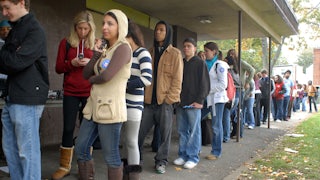Tens of thousands of Georgia voters have had their registrations challenged, often en masse and for obscure technical reasons. Election officials have rejected the overwhelming number of such challenges but they add additional strain to a voting system finding its way through its first test since a controversial overhaul. And critics say such controversies typify the sort of obstacles the law deliberately established.
In the spring of 2021, Georgia Governor Brian Kemp signed a Republican-authored measure retooling the state’s voting system, creating restrictions to voting in the wake of a string of narrow, high-profile victories by Democrats, including President Joe Biden’s victory there and those of Senators Raphael Warnock and Jon Ossoff, which gave their party control of the upper chamber. Tuesday marks the first midterm election since the passage of the law, testing voters and election officials alike as they navigate the new restrictions.
Kemp argued that the law—one in a series of measures passed by GOP-controlled state legislatures after President Joe Biden’s 2020 victory—would make it “easier to vote and harder to cheat.” But critics contend that the law erected barriers that disproportionately affected Black and urban voters, demographic groups that generally lean Democratic.
The measure, Senate Bill 202, achieved national notoriety for making it illegal for groups to offer food or water to those waiting in line to vote. The first election under the new system is also clarifying other ways it has complicated life for Peach State voters.
Take the challenges: Although it has been legal for individuals to challenge voter eligibility for more than a decade, it was a little-used tool. The new law highlighted it, underscoring that there is no limit to the number of voters who can be challenged. The original intent of such challenges is to give individuals a way to report outdated voter information: a neighbor who has moved away, for example. But right-wing groups and activists have leveraged the change to call the status of tens of thousands of people into question, many in metro areas. Critics argue that’s not a coincidence; that these challenges are aimed at suppressing Black voters and young voters, who are concentrated in and around cities.
“It seems to be an intimidation tactic,” said Hannah Joy Gebresilassie, the executive director of Protect the Vote GA, a nonprofit organization founded by Black women in the wake of the new law. “We could be focusing on strengthening our system—there’s a lot of things we can improve—versus trying to use that time to go in circles around something that’s going to get dismissed.”
And while the vast majority of these challenges have indeed been tossed out, and those who have their eligibility challenged can still cast provisional ballots, it just adds unnecessary strain and complication to the election process.
S.B. 202 also targets absentee voting by limiting the amount of time that voters could request absentee ballots, imposing strict ID requirements for obtaining them, and making it illegal for election officials to preemptively mail them to all voters.
In 2020, at the height of the coronavirus pandemic, 1.3 million voters cast their ballot by mail. As of Sunday, slightly more than 216,000 voters had cast absentee ballots.
Because the period in which voters can request absentee ballots is
shortened, and given the strain that this puts on county election
boards, Georgians may not receive them in time to return them by Election Day.
These changes particularly affect young voters, said Alex Ames, the organizing director for the Georgia Youth Justice Coalition, who said that their data shows that at least 15,000 young voters, mostly college students, did not receive their ballots on time. Ames, who is herself a 20-year-old Atlanta college student, knows peers who will have to trek from their out-of-state universities back to their Georgia hometowns to vote in person on Election Day. “When young people vote for the first time, that is their first toe dipped into the water of democracy,” Ames said. “And when we make that extraordinarily difficult for them; when we make voting absentee really difficult, drop box [access] really difficult, early voting difficult, and Election Day more confusing than ever, we’re putting all these barriers in the way of young people casting a ballot.”
And such problems also affect elderly and disabled voters, such as the 103-year-old voter who, Ames said, requested a nonemergency ambulance to ride to the polls because she had not received her absentee ballot in time.
Getting absentee ballots is just part of the challenge. The law also decreased the number of drop boxes and the hours at which they are accessible, a change from the 2020 election. “People were used to having a lot more drop boxes and may have thought, like, ‘Oh, I used that drop box last time, I’ll just use it again.’ And then found out it’s not there anymore,” said Marjorie Pak, an Emory University professor who volunteers with Protect the Vote. “Or even if it is there, it’s not there overnight; you have to go inside. Or it’s not there after the Friday before the election, which, in the past, they were available all the way through Election Day.”
The law expanded early voting in some primarily rural counties that did not previously offer extended hours. But it did not require early voting to be available on Sundays, potentially limiting efforts by Black churches that have traditionally organized “souls to the polls” efforts. (An earlier version of the law would have outlawed early voting on Sundays altogether, but that provision was changed after public outcry.)
The new barriers extend to Election Day itself as well. S.B. 202 makes it more difficult for people to cast provisional ballots if they show up to vote at the wrong precinct, for example. If a person does so before 5:00 p.m. on Election Day, they will have to travel to the correct precinct to cast their vote. In 2020, when those trying to vote in the wrong location could cast a provisional ballot regardless of the time of day, it was the most common reason for doing so. Biden won 64 percent of the provisional ballots that were counted in that election.
To be sure, the new voting obstacles have not been universally effective. Roughly 2.5 million Georgians have voted early this year—a record number and a significant increase from 2018, when around two million cast early ballots. But that figure at least in part reflects defiance of the new law, voting rights activists say. “People have definitely heard of the restrictive bills that have been coming through Georgia and across the nation,” Gebresilassie said. “People are, at a very base level, saying: ‘We know that laws are changing, and we want to make sure our voting rights are protected.’”
Perhaps the most insidious effect of the new law is the sense of uncertainty and fear it has injected into the voting process. Emory University’s Pak has told people to vote in person if they don’t receive their absentee ballot in time to mail it: They can either turn in their absentee ballot in person or sign an affidavit affirming that they did not receive their ballot and then vote in person. “This has always been true, and it’s still true,” she explained. “But I’m hearing a lot more, ‘Really? Will I get in trouble for trying to vote twice? How can I be sure that I’m not going to be charged with some kind of crime if I try to go and vote in person after I requested an absentee ballot?’”
Tembi Hove, a member of the union Unite Here Local 23 in Atlanta, has been canvassing in Columbus, Georgia, ahead of the election. While many of the people she speaks to in Democratic-leaning neighborhoods understand the stakes of the election, and the changes made by S.B. 202, others do not—and so she focuses on basic voter education as much as encouraging people to support Democrats.
“If your voice wasn’t important, if your vote didn’t count, if it didn’t matter, there would be no suppression,” she said. “There would be polling places all over the place. You could get an absentee ballot whenever you felt like it. The restrictions would not be as severe as they are if your vote did not matter. And that’s what we need everybody to understand.”










